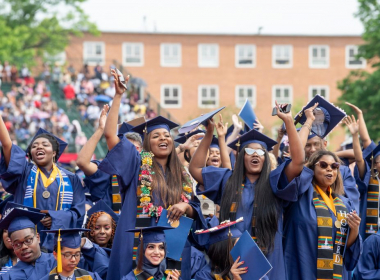
Professor Earle C. Mitchell is a respected educator, author and Morehouse man. Today, he shares his thoughts on the legacy of Dr. Martin L. King Jr.
“Dr. Martin Luther King. Jr. is etched into my being on a myriad of levels; from being eight months and five days old when he was assassinated, to the fact I attended the historic Morehouse College 37 years after he graduated. His being, and spirit, has captured the national and international consciousness — and America will never be the same because of him. The strategic acumen that he demonstrated during the Civil Rights Movement was laser like. And in true courageous fashion, he was willing to give his life — which he did — so that African Americans and America in general could move forward. He is without a doubt one of the, if not the, most important voice of the 20th century. And the question becomes, what is his legacy to me?
“Dr. King’s conviction to the cause of non-violence and justice, and his almost lyrical manner of expression in articulating that cause is prophetical in nature. While he was a complex man, his focus on eradicating hate, which in many instances reduced the rule of law to be applied to all citizens, is nothing short of a Herculean feat. His being was larger than life and his spirit could not be encapsulated. As such, his spirit moved along a vector of truth that could not be shaken. Through the taunts, threats, assaults, stabbing, marches, Dr. King remained resolute in his quest toward equality for all. This resolute nature of Dr. King captured America! It captured America in such a way that when the beatings shown from the walk over the Edmund Pettus Bridge, all of America came to ‘march.’ This too would have tragedy attached to it. Unfortunately, after the third march over the Edmund Pettus Bridge, and Dr. King’s speech that day, Viola Liuzzo was murdered by a sniper’s bullet. This episode in Dr. King’s life was yet another move toward freedom for all.
“In looking at all the marches, speeches, meetings and political engagements Dr. King kept, his strategic acumen to move the movement forward was stellar. While there may have been missteps, there was always a plan. When we look at the marches today, we see that there was always a policy change that was sought to be effectuated either on the national, state or local level. As such, there were lawyers on the ready when marchers were sent to jail. There were secret conversations about who would be staying where and their movements closely guarded. And always in the forefront, was the understanding that a change was going to come. All of this is happening under the specter of hate and the possibility that someone may lose their life. This is the true demonstration of courage under fire. Dr. King as the leader of this movement was under a considerable amount of pressure, an amount of pressure that most of us can never truly know nor understand.
“Dr. King had many speeches that can be quoted, but for me the ‘I’ve Been to the Mountaintop’ speech stands out. This speech stands out because of its prophetic tradition, which ultimately foretold Dr. King’s demise. His allusion to taking a trip through time to engage the problems of past eras was masterful. And how he related those eras’ problems to that of 1968 America, and beyond, was oratorical skill at its highest. As Dr. King said, “And also in the human rights revolution, if something isn’t done and done in a hurry to bring the colored peoples of the world out of their long years of poverty; their long years of hurt and neglect, the whole world is doomed. Now I’m just happy that God has allowed me to live in this period, to see what is unfolding. And I’m happy that he’s allowed me to be in Memphis.” Here, in simplistic language, Dr. King linked the struggle of the Memphis, Tennessee, sanitation workers with various historical struggles throughout the ages.
“Unquestionably, Dr. King can be seen as one of the 20th century’s pre-eminent orators. Yet, it was not just that oratorical skill that was a marvel; the fact that he used the skill to move humanity and America forward is the real story. His courage, paramount! His commitment to the struggle, solid! In Dr. King, we are the inheritors of a great tradition of strength, love, commitment and truth. His legacy, to me, is that of a truth teller. He spoke truth to power, always. Whether in platitudes or simplistic notions, the truth was the cornerstone of his power. It is in being the truth that we can all better know Dr. King, and recognize that we too can be instruments for positive change wherever and whenever we are called.”
Earle C. Mitchell III is an adjunct professor. He is the author of Egyptian Origins of Washington, D.C. Vol. I: African Gods in America’s Capital. Follow Mitchell on Twitter at @3rdiMediaCorp and at www.3rdimedia.com.











